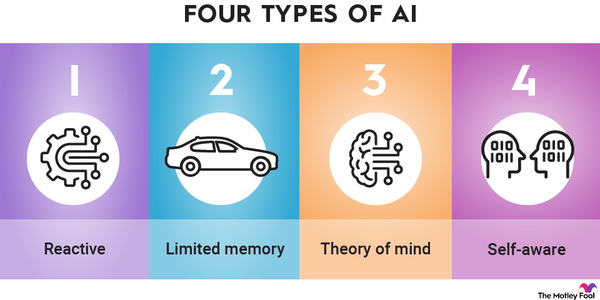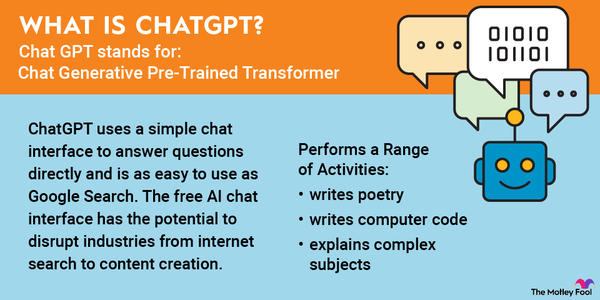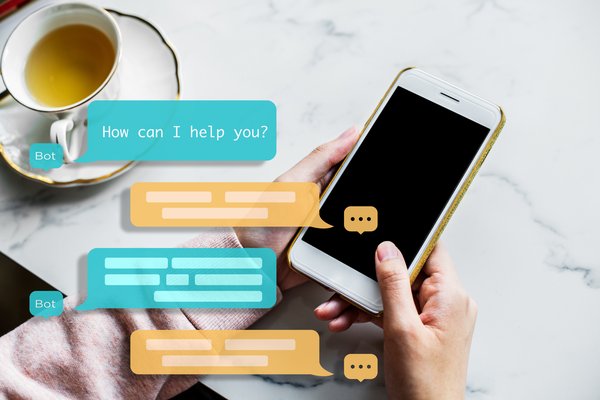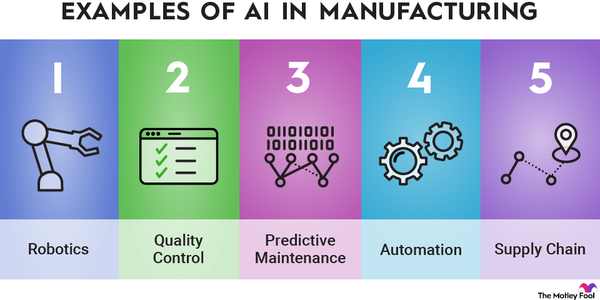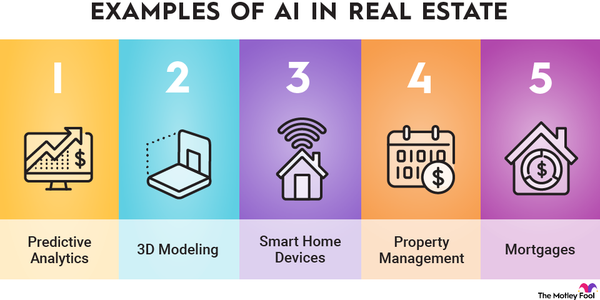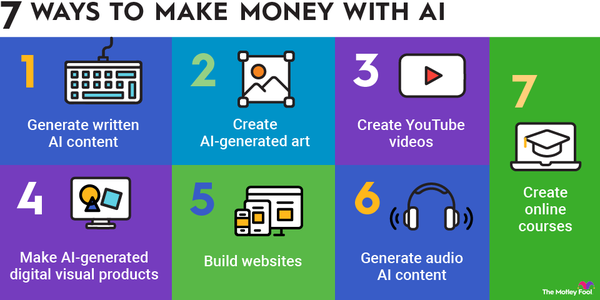There's no doubt about it: Artificial intelligence (AI) is the buzzword of 2023. The launch of ChatGPT has signaled the beginning of a new era in AI, and while technologists may have been aware of the power of generative AI, the capabilities of the new chatbot have shown the transformative nature of the technology.
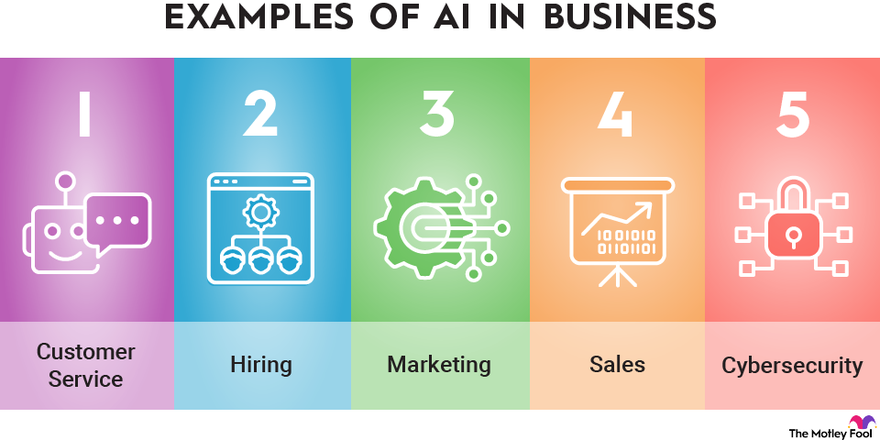
Already, it's posing a challenge to Alphabet's (GOOGL 1.54%)(GOOG 1.72%) Google search empire. ChatGPT is being used for everything from legal contracts and medical advice to recipes and online content, and the implications both for businesses and everyday users are vast.
Understanding AI
Understanding AI
AI refers to the ability of computers and machines to perform tasks with human-like intelligence. Often, this refers to machine learning or an AI application that allows a computer to teach itself things as it's given information. For example, machine learning enables tools like spell check or grammar check to work.
Other forms of AI include robotics, natural language processing, computer vision, neural networks, and deep learning, which use human-like intelligence to do things beyond the scope of a typical computer or machine. One way investors can take advantage of this new opportunity is with an AI exchange-traded fund (ETF), which gives you exposure to a range of companies working with AI.
It's no surprise that Microsoft (MSFT -0.1%) said that Azure OpenAI saw its customer base grow more than tenfold quarter over quarter to more than 2,500 customers in the quarter that ended in March. With AI at a turning point, it's becoming a more valuable tool in business than ever.
In this article, we'll discuss many of the ways that AI is being used in business, including AI in customer service, AI business tools, and AI applications in business.
Use cases
Use cases for AI in business
These technologies have a wide range of applications for businesses, and many publicly traded companies have begun experimenting with AI tools or are using them in everyday functions.
1. Customer service
1. AI for customer service
One of the most common applications of AI in business is for customer service. Businesses have eagerly embraced AI chatbots as an initial tool for solving customer problems. For example, airlines use chatbots to answer customer questions about flight status and baggage requirements or even to help rebook a flight when applicable.
Some AI stocks have gone even further with AI customer service. Lemonade (NASDAQ:LMND), the insurance company, uses AI chatbots to handle customer queries about new policies and claims. Lemonade's AI bots, AI Jim and AI Maya, run on an AI-powered decision-making layer, which takes data on the applicant, comparison data, and other available data to help price insurance premiums.
AI chatbots can help businesses serve customers faster and save on customer service labor. And they're likely to become more commonly used as the technology improves.
Voice assistants are another form of AI used for customer service. Zendesk, which makes customer service AI agents, says its AI can automate as much as 80% of customer interactions, giving human agents more time to focus on higher-value work.
2. Hiring
2. AI for hiring
Customer service is a key function for almost any business, but hiring might be an even more important one. Companies use AI to screen applicants who submit resumes online. They use predictive analytics to help sort through candidates more quickly and analyze resumes, social media profiles, and other available online behavior to screen candidates for interviews.
Increasingly, companies are also using large language models like ChatGPT to write announcements for job openings, a key component of recruiting. Microsoft's LinkedIn has used AI tools for years and recently added a feature that helps recruiters write job descriptions. It has also used AI tools to match job seekers with opportunities and help users connect with others who might share interests.
Amazon (AMZN 0.73%) has developed its own internal AI hiring tool, Automated Applicant Evaluation. The tool determines how qualified job applicants are by comparing their resumes to those of current Amazon workers in the same role.
3. Marketing
3. AI for marketing
AI tools are also used in marketing in various ways. Much like AI is used in customer service to respond to customers quickly, it's used in marketing strategies when speed is at a premium. AI can help serve customized messages based on profiles. It's also used for automated ad campaigns, controlling media buying to maximize returns on investment (ROI).
Increasingly, AI is also being used for content generation. Coca-Cola (KO 0.16%) launched a contest open to anyone to make digital art using Coca-Cola's brand assets and OpenAI's DALL-E image-generation AI. The company said the winning submission could appear on a billboard in Times Square and in London's Piccadilly Circus.
Recommendation AI is another example of AI in marketing. Companies like Amazon use AI to recommend items based on past purchases, and Netflix (NFLX 0.78%) uses AI to recommend what to watch. You've probably seen the phrase "Since you liked..." used in this context.
These algorithms play a key role in customer satisfaction, and services like Netflix depend on predictive AI to choose the right programming to offer subscribers.
4. Sales
4. AI for sales
AI is increasingly being used in sales as well. Sales teams seem to be among the early adopters of generative AI tools like ChatGPT.
Microsoft launched Viva Sales, a generative AI application that helps salespeople write customized emails and recommendations to their customers. Salesforce (CRM 2.21%) launched a similar tool called Einstein GPT, which creates personalized content across every Salesforce cloud to make employees more productive.
AI can also help organizations analyze the large volumes of data generated by sales pitches and agreements and then learn and apply them to improve success rates. Like other functions, AI can also help salespeople by automating tedious tasks. According to HubSpot (HUBS 2.36%), sales professionals save more than two hours a day by using AI to automate tasks.
AI tools can simplify and even completely handle some administrative tasks. It can even help employees write better emails and generate better responses.
5. Cybersecurity
5. AI for cybersecurity
AI is also commonly used in cybersecurity. AI tools help organizations analyze large amounts of risk data to accelerate response times. Machine learning and natural language processing are being used to recognize patterns and develop threat intelligence from papers, blogs, and news stories.
Cybersecurity software companies like CrowdStrike (CRWD 3.21%) utilize AI to generate alert signals and test hypotheses and use other AI tools to investigate threats. It calls its Falcon platform AI-native.
Machine learning tools help CrowdStrike recognize distributed denial of service (DDOS) attacks and assist analyst insight and decision-making with real-time data and intelligence. Overall, AI in cybersecurity eliminates time-consuming tasks typically done by human experts, allowing humans to focus on more important security needs.
Related investment topics
Is AI the future of business?
There's little doubt that AI will have a significant impact on business in the coming years. Pundits are already forecasting massive shifts in the labor force and several industries that could disappear or significantly evolve from where they are today.
AI also presents obvious opportunities for businesses to save money by cutting costs, helping it to become eagerly embraced by big and small companies. Expect businesses to lean even further into AI in the future as the technology improves. The new race set off by ChatGPT should only accelerate business demand for AI tools.








